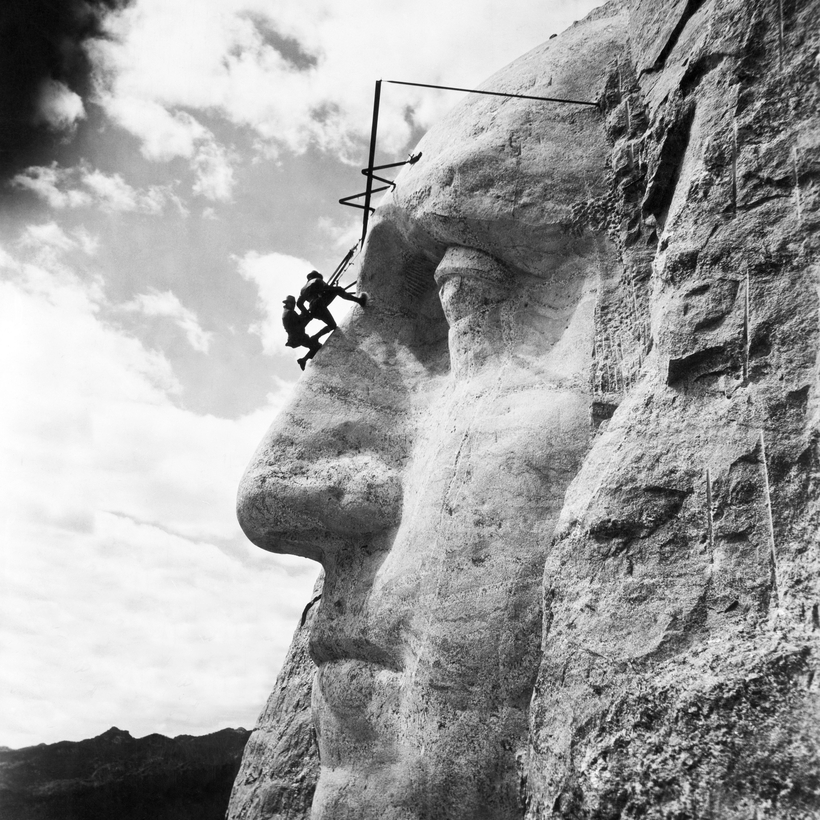Nathaniel Philbrick has become known for his meaty tales about courageous seafarers, rebellious colonists, and ambitious men on ill-fated expeditions, all prepared with precision and zest, and fans of the prolific historian have grown accustomed to welcoming each new book like an invitation from a chef.
In Travels with George: In Search of Washington and His Legacy, Philbrick retraces three trips that George Washington took during his presidency. Less a meaty tale than a pupu platter of historical anecdote, travel writing, personal reminiscence, dog stories, and an alarming encounter with a tornado, the book may not fill you up, but you’ll probably find a lot to like.
Through the pieces, fortunately, a valuable view of Washington emerges. Most founders have descended to us with personalities intact—worldly, witty Franklin; persnickety Adams; Hamilton in a hurry; Jefferson in his contradictions. But Washington comes to us sheathed in virtue. As smooth as the obelisk that stands in his name, he is a symbol without features.
The stories that Philbrick tells about these three carriage trips, to Rhode Island, Long Island, and South Carolina, meanwhile, serve as personal snapshots of our first president, caught in the act of nation-building.
A Different America
When Washington made these journeys, between 1789 and 1791, America was no sure thing. One national government had collapsed, and while Europe provided many examples of usurpations, civil wars, breakaway provinces, and hostile takeovers, there were no precedents of successful democracies. In isolated communities far from the capital, cranky New Englanders and disputatious Pennsylvanians threatened to unravel the whole deal.
Washington—a natural aristocrat with a democratic soul—grasped that his personal touch might just be the ingredient that would help the new nation to gel.
The other founders are credited with knowing politics and government; Washington understood leadership. Philbrick shows us a man of physical grace and character who grasped the personal effect he had on people. He stage-managed his appearances with great effect, arriving in some towns on horseback, wearing military regalia and accompanied by a cavalry escort, and pulling into others without fanfare, wearing a plain brown suit.
Everywhere he visited, he stayed in public taverns, knowing that he was likely to encounter ordinary and often substandard comforts. Without airs or privilege, he pressed the flesh, attended receptions, met his revolutionary comrades, toured the new mills and factories. It was a knowing application of grandeur and humility, a combination of shock and aw-shucks designed to cement allegiance to the new government.
Philbrick has great fun with the discovery that in many towns that Washington visited, there has been handed down for generations a version of a tale in which a child sees the president and blurts, “Why, he’s only a man!” The joke, obviously, is that, yes, he was just a man, but also so much more.
Including a slave owner. In the most upsetting part of the book, Philbrick introduces Ona Judge, a young woman held in bondage by Martha Washington. After Judge escaped, the president went to great lengths to recapture her, even offering a reward. In a cruel display of power, Washington hired bounty hunters to find Judge, who eluded her pursuers with the help of her abolitionist neighbors.
This fact is shocking but not unexpected—seemingly daily we are learning of the particular sins of our ancestors. Still, it’s disconcerting to see such a sad and ugly scar on the most indispensable figure of our founding myth. Recognizing that our ancestors weren’t who we thought they were makes it harder for us to know who we are.
Today, like adolescents discovering our parents’ foibles, we are rebellious, disruptive, disdainful of authority, and archly confident in our personal superior morality. With luck, one day we will mature and realize that our happiness depends not on addressing their shortcomings but on focusing on our own.
Jamie Malanowski is a New York–based writer


